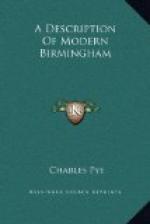EAST SIDE;
HERE
LIETH THE
BODY OF
REBECKAH
PEMBORTON
WIF OF ISAAC
PEMBORTON
BVRI 27 OF
DECEM 1660
HERE
LIETH THE
BODY OF
ISAAC PEM-
BERTON HE
DEPARTED
DECEM 4: 1697
AGED 76
WEST SIDE.
THO I AM
HERE LAID
LOW IN GRAVE
THINK ON THE
COVNSEL WICH
I GAVE THO TRO
VNLES MAY TO Y
DECEND: A GRAC
LOVS BLESSIN
IN THE END
THE FIRST
STONE SET VP
IN THIS YARD
THO OTHERS SINCE
MORE FINLY CARVED
WAS IN REMEMBERANCE
OF SHE
AN OBJECT OF
MORTALITY]
Returning into the main road, you perceive on the left a double row of lofty elms, that extend about half a mile; and at the termination of the vista, Aston hall and the lofty spire of the church produce a grand effect. On the right there is a sheet of water that turns a mill for the use of the Birmingham manufacturers. You soon after cross Salford bridge, to the right of which is an aqueduct that conveys the Birmingham canal over the river Tame. The village of Erdington does not contain any object deserving of attention, but a little beyond on the right is Pipe hall, an ancient seat of the Bagot family, now occupied by the Rev. Egerton Bagot.
In the vicinity there are several neat houses, which are chiefly inhabited by wealthy people, who have retired from Birmingham. A short distance from hence Mary Ashford was found drowned on the 27th May, 1817.
About the fifth mile stone, the eye is gratified on the left with an extensive view over the country, which continually varies for a considerable distance, until a most beautiful and picturesque landscape presents itself; a white house belonging to a mill and an extensive sheet of water being in front, Barr-beacon in the back ground, and the woods in Sutton park on the right.
Sutton Coldfield.
This remarkably neat and clean town is situated about midway between the town of Birmingham and the city of Lichfield; lying south from the latter place, its name is supposed to be derived from South Town, and by corruption, Sutton. There is a very considerable portion of land near this town, where travellers say the air is equally sharp and cold as it is upon the highlands of Scotland, and from this circumstance the latter part of its name originates. Independant of this tract of land, there is another contiguous to it, which is denominated the park, wherein a part of the Roman road, called Icknield Street, still remains perfect; there is also a spring called Rounton well, whose water is remarkably cold and produces a very copious stream, to which numerous people who are afflicted with cutaneous disorders resort, and derive considerable benefit from drinking and bathing therein. It cures the most virulent itch in the human species, and also the mange in dogs, if sufficient care is taken to wash them well in the stream, but a slight washing will not produce the desired effect.




